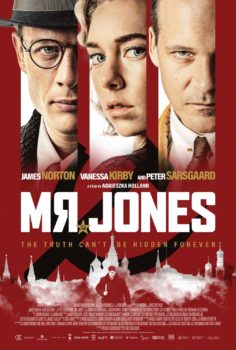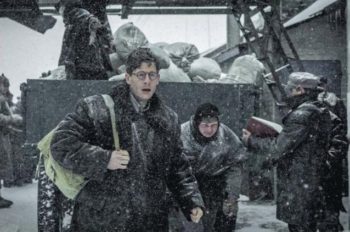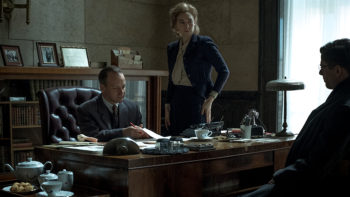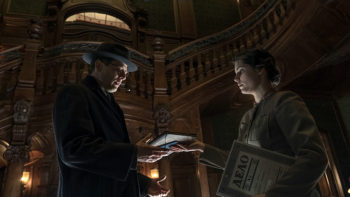Mr Jones: Film Review
 An historical thriller from Agnieska Holland, starring James Norton, Mr Jones features an impressive array of historical characters – but does the script truly bring them to life? Here is Steve Austin’s review.
An historical thriller from Agnieska Holland, starring James Norton, Mr Jones features an impressive array of historical characters – but does the script truly bring them to life? Here is Steve Austin’s review.
As a filmmaker, Agnieszka Holland has made it her stock-in-trade to deal with the darker moral implications of war, especially through the lens of religion and a strongly felt political agenda. Her adaptation of The Secret Garden is considered by many to be the best version of the book brought to film, simply by virtue of how well considered it goes into its characters backstories and examines the traumas involved even in a somewhat heightened fantasy situation.
In Mr,  Jones she examines Stalin’s Russia and the agricultural collectivism that caused a famine and near-genocide of many of the lower and middle classes. Told from the perspective of Welsh journalist, Gareth Jones (James Norton), who was a freelancer at the time, facing the communist bureaucracy and alienation firsthand. Jones was an outspoken activist with high ideals of humanitarianism that unfortunately got him in trouble with employers and the powers-that-be, leaving him a broken man in his later years. Nonetheless, he toiled to uncover this great injustice to the world and was key to forcing change of the Russian Government’s policies.
Jones she examines Stalin’s Russia and the agricultural collectivism that caused a famine and near-genocide of many of the lower and middle classes. Told from the perspective of Welsh journalist, Gareth Jones (James Norton), who was a freelancer at the time, facing the communist bureaucracy and alienation firsthand. Jones was an outspoken activist with high ideals of humanitarianism that unfortunately got him in trouble with employers and the powers-that-be, leaving him a broken man in his later years. Nonetheless, he toiled to uncover this great injustice to the world and was key to forcing change of the Russian Government’s policies.
 With a very impressive array of historical characters, both real and fictional, under his belt as an actor (see his terrific turn as John Brooke in Greta Gerwig’s recent much-praised Little Women), Norton imbues Jones with an anxious energy and a somewhat naively confrontational outlook on world politics. He throws himself into the dialogue with an enthusiastic intelligence that can’t quite hide the sometimes overwritten expositional flabbiness of the script. I’m not totally convinced that this rendition of Jones would have been fully capable of the organisation or coordination of an interview with Hitler, which is one of the pieces of writing he is most known for.
With a very impressive array of historical characters, both real and fictional, under his belt as an actor (see his terrific turn as John Brooke in Greta Gerwig’s recent much-praised Little Women), Norton imbues Jones with an anxious energy and a somewhat naively confrontational outlook on world politics. He throws himself into the dialogue with an enthusiastic intelligence that can’t quite hide the sometimes overwritten expositional flabbiness of the script. I’m not totally convinced that this rendition of Jones would have been fully capable of the organisation or coordination of an interview with Hitler, which is one of the pieces of writing he is most known for.
 The rest of the ensemble cast fill out this world well, especially Vanessa Kirby as a sympathetic and put-upon secretary, Ana Brooks. However, Peter Sarsgaard as Pulitzer Prize-winning New York Times Editor, Walter Duranty, leans too far into the theory of “the banality of evil” as a basis for his character study and delivers an uneven supporting performance that is at once overblown in its pomposity and too indirect in physical staging.
The rest of the ensemble cast fill out this world well, especially Vanessa Kirby as a sympathetic and put-upon secretary, Ana Brooks. However, Peter Sarsgaard as Pulitzer Prize-winning New York Times Editor, Walter Duranty, leans too far into the theory of “the banality of evil” as a basis for his character study and delivers an uneven supporting performance that is at once overblown in its pomposity and too indirect in physical staging.
Cinematography is all very neat and great looking. Interiors are very dark, stark in the beginning but mostly subdued in the later stages, which helps build the sense of disquiet and secret keeping, so there is a great sense of contrast whenever we see outside or when light spills into a room. There is a great choice to wash-out the colour to almost black & white at an important stage part way through the film when Jones is following his line of investigation among the cold climate and squalor of the people. The one thing it really lacks is a sense of grime to the lower socio-economic environments, which leads to an unfortunate feeling of romanticised “poverty tourism” on the part of the filmmaker.
Despite my above criticisms, Mr. Jones certainly all holds together as the sum of its parts reasonably well, but I do feel I’ve seen this sort of story before, even if the specifics are new to me, and its tendency to be so talky means there isn’t any real attempt to make it relevant to a modern audience.
2 Stars
~Steve Austin
- Mr Jones: Film Review - February 28, 2020
- A Walk In The Woods - September 3, 2015
- Film Festival Diary: Day 2 , part 1 - July 18, 2015
